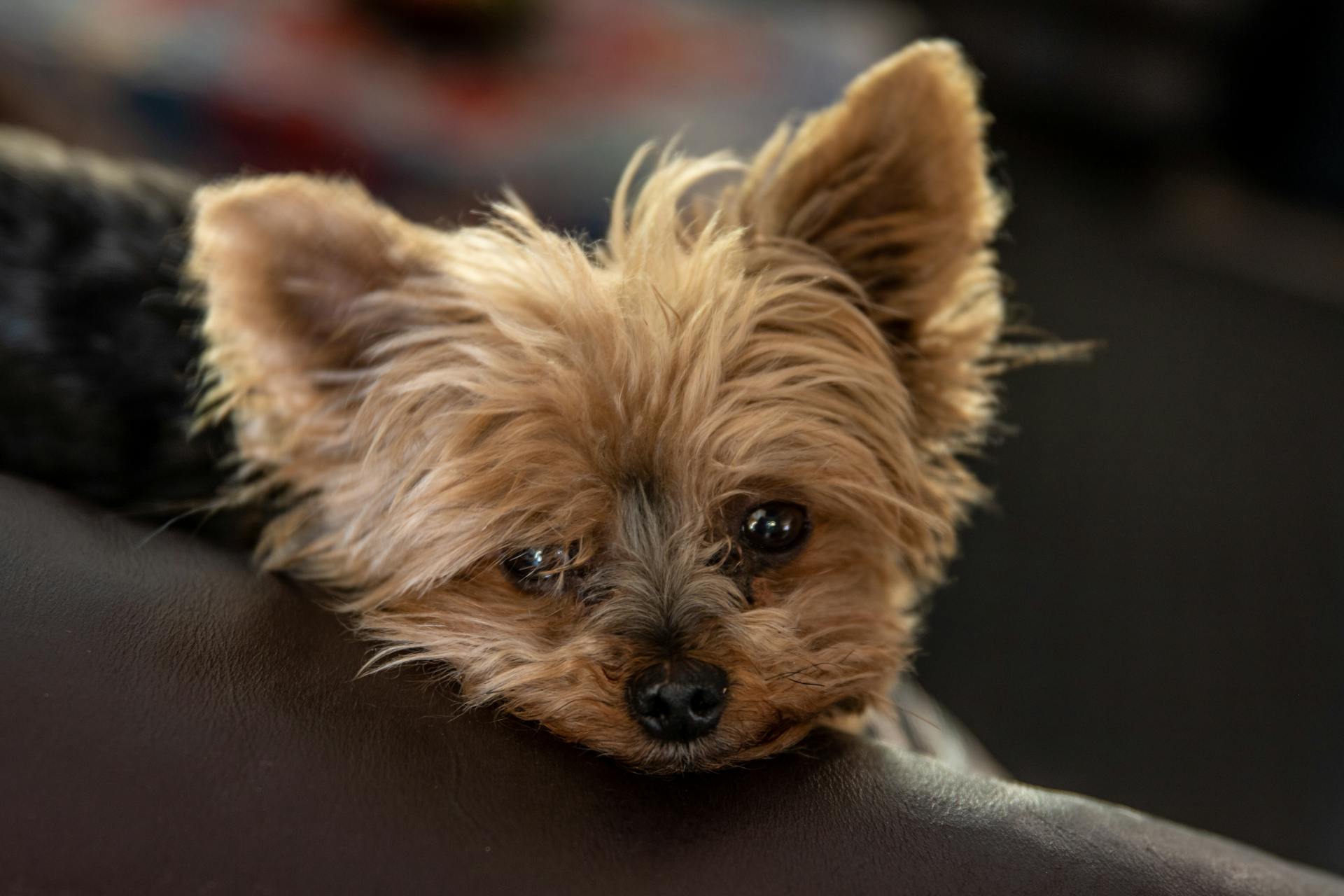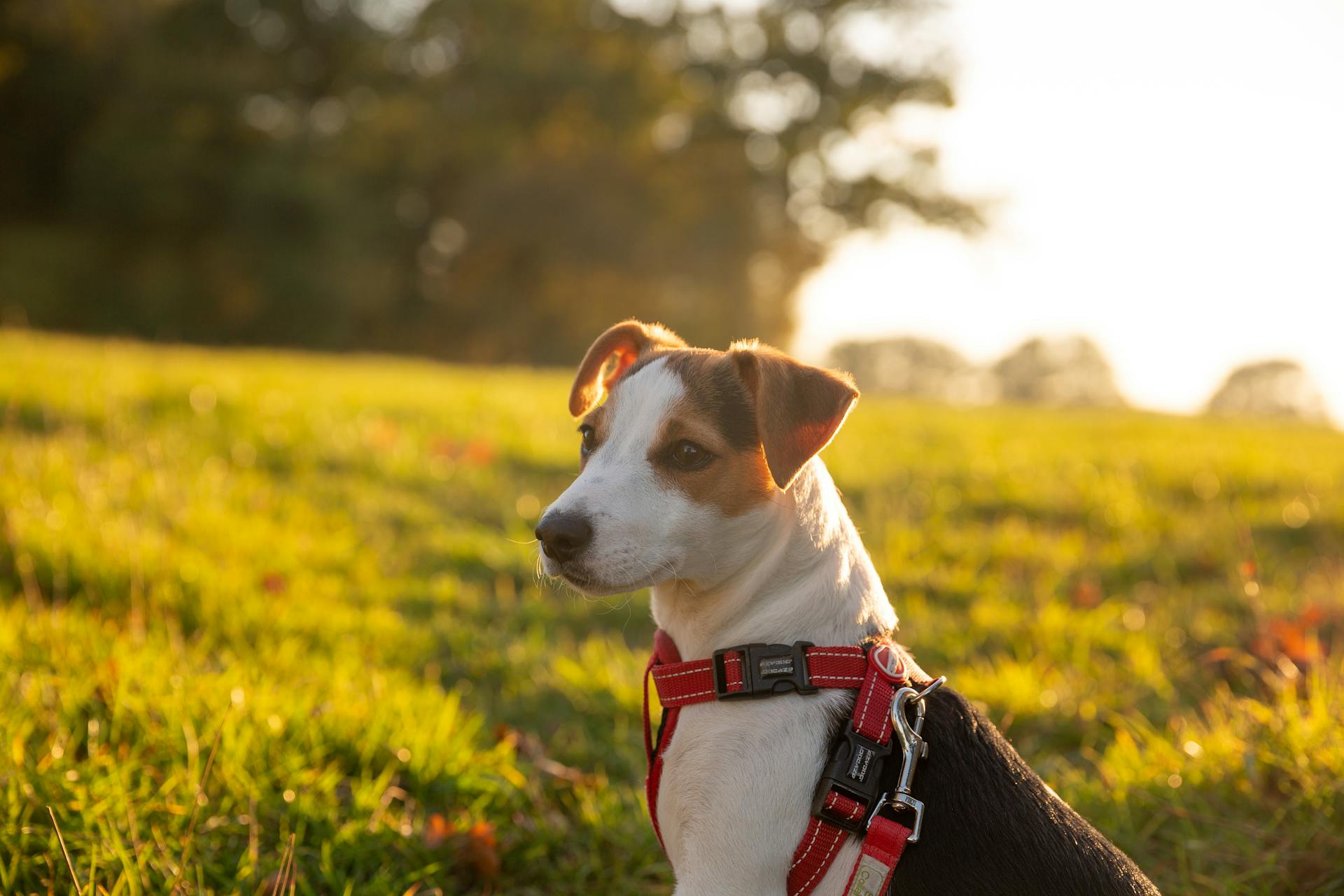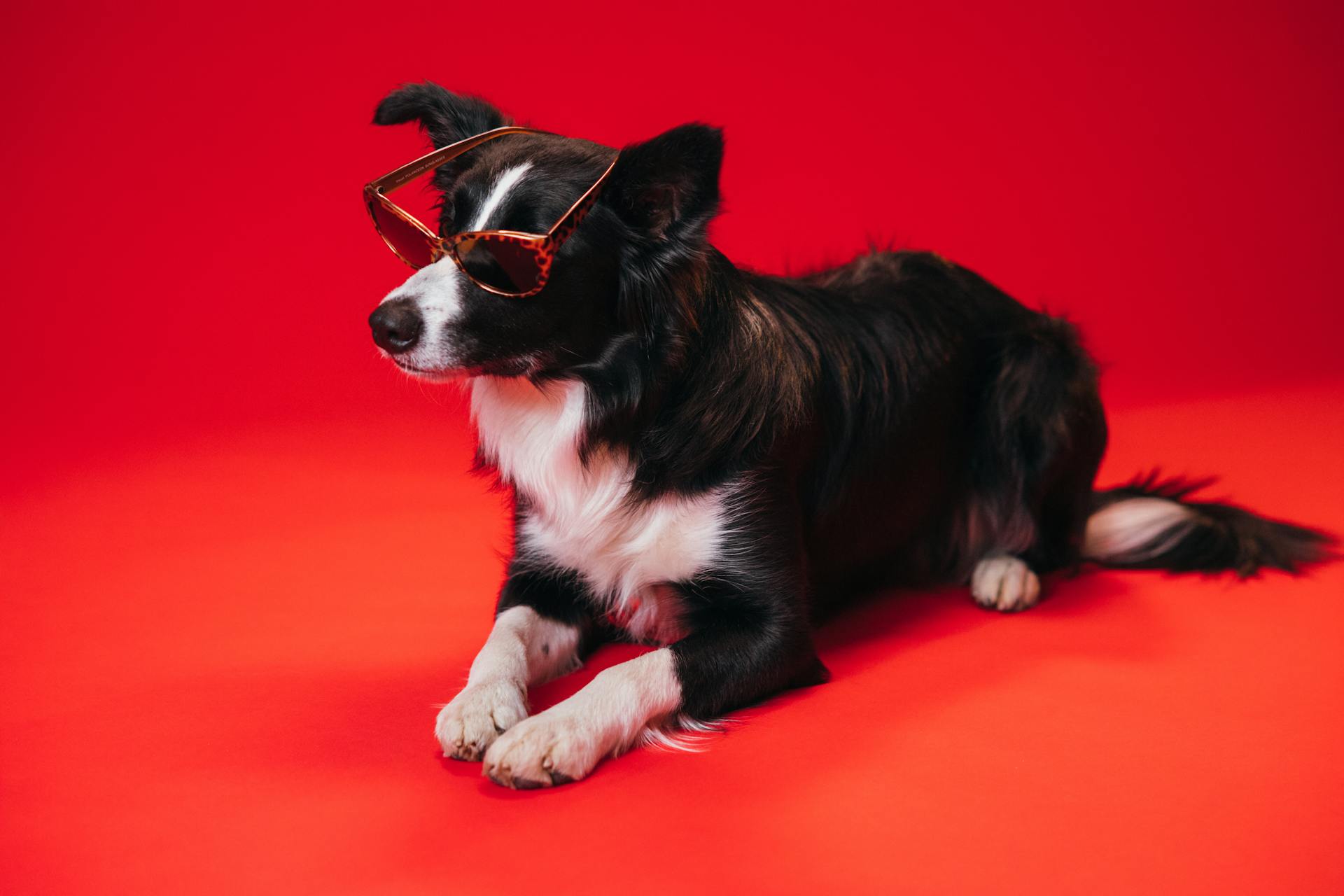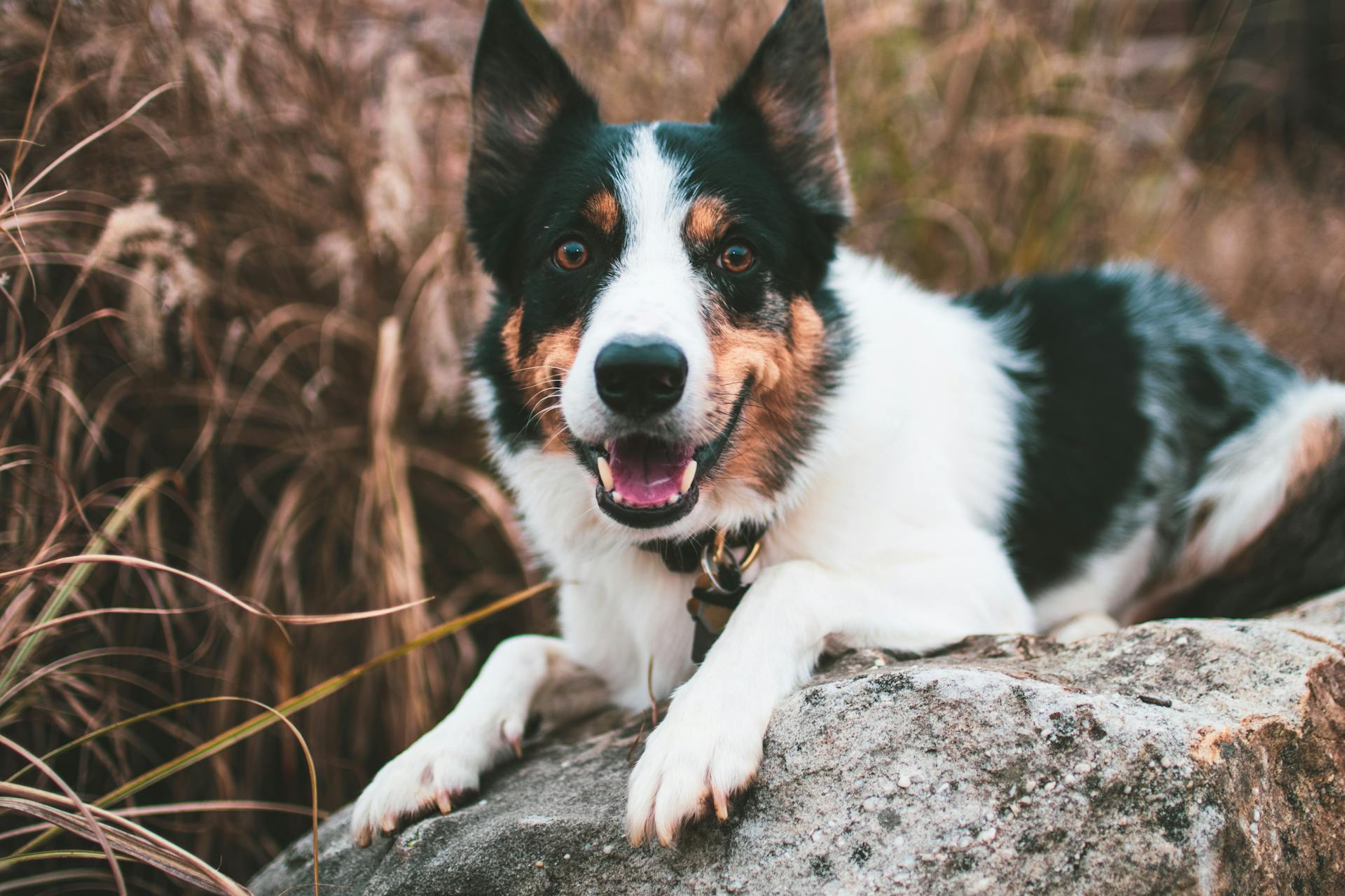
Border Terriers are a beloved breed for many dog owners, and it's easy to see why - they're charming, energetic, and affectionate companions.
They typically weigh between 10-16 pounds (4.5-7 kg) and stand about 15 inches (38 cm) tall at the shoulder. Their short coats require minimal grooming, making them a great choice for busy owners.
Originating from the Anglo-Scottish border, Border Terriers were bred to hunt small game like foxes, rabbits, and hares. They're natural hunting dogs with strong instincts that still shine through today.
Their distinctive beards and eyebrows give them a charming, endearing appearance that's hard to resist - and it's not just their looks that win hearts!
For another approach, see: Are German Shepherds Good for First Time Owners
Personality and Temperament
Border Terriers are known for their plucky independence and self-assured nature, which can sometimes make them a little stubborn.
This breed has a high prey drive, inherited from their original purpose of chasing small animals, so cat owners should be aware that they may see their feline family members as something to chase. They also tend to get on with people and other dogs, but introducing them to new animals requires extra care due to their confident nature.
Border Terriers need plenty of engagement and interaction with their humans, or they'll find ways to keep themselves entertained - often in undesirable behaviors like digging up the lawn or terrorizing local wildlife. They're affectionate but not overly needy, making them a great fit for families who want an outgoing companion without too much drama.
A bored Border Terrier is trouble waiting to happen, so it's essential to provide regular exercise and playtime to keep them happy and healthy. With proper training and socialization, they can thrive in households with children and other dogs, but introducing them to cats requires careful consideration.
Here are some key personality traits to consider when bringing a Border Terrier into your family:
- Plucky independence and self-assured nature
- High prey drive (may see cats as something to chase)
- Affectionate but not overly needy
- Need plenty of engagement and interaction with humans
- Can be stubborn at times
- May get bored if not provided with enough stimulation
Overall, Border Terriers are lively, confident companions that thrive on activity and attention. With the right care and training, they can become loving and loyal friends for many years to come.
Exercise
Exercise is a vital part of your Border Terrier's life. They need daily walks and plenty of time to explore, burn energy, and play.
To keep them physically and mentally healthy, you'll need to provide at least one hour of physical exercise per day for adult Border Terriers. This can be broken down into shorter walks if they're young or growing.
Their independent nature means they might wander off if not properly trained on recall exercises. Spending extra time on this will help prevent unwanted behavior like chasing and aggression. Ball games are a great way to make recall training fun!
Border Terriers love to chase, so it's essential to provide them with plenty of mental stimulation through play and exercise. They can be prone to dog aggression if not given proper introductions as puppies, so start training from 8 weeks old.
Here are some things to consider when exercising your Border Terrier:
- Age: Young or growing dogs might need shorter walks each day.
- Health: Consider any health issues or injuries that may affect their exercise needs.
- Personality: Some dogs will enjoy peaceful walks, while others will thrive on social interactions and playdates.
Remember to check with your vet for advice on exercising your dog, as they can provide tailored guidance based on their individual needs.
Dog Grooming Needs
Border Terriers have a hard, wiry coat that requires special care from a professional dog groomer.
Their double coat sheds all year round and needs to be brushed weekly with a combo brush to prevent matting and tangling. You can also use this time to check your dog's nails and clip them as needed, typically every two weeks.
The Border Terrier breed comes in four color varieties: dark, light, blue, or tan. While their coat is hypoallergenic and may be better suited for owners with allergies, it still needs regular grooming.
During shedding seasons, which occur in spring and fall, you'll need to spend more time bonding with your pup over grooming. This involves hand-stripping the wiry topcoat every day, which can take about 30 minutes.
Their coat rarely needs bathing, but if your dog is particularly active and loves getting dirty, you may need to bathe them once a month. It's essential to avoid stripping the oils that help provide the coat's distinctive weatherproof quality.
For more insights, see: When Is the Best Time to Breed a Dog
Dental health is crucial for Border Terriers, so start brushing their teeth twice a week when they're puppies to get them used to the feeling. This will help prevent gum disease and other health problems.
Here are some key grooming needs to remember:
- Brush your Border Terrier's coat weekly with a combo brush
- Check and clip nails every two weeks
- Hand-strip wiry topcoat daily during shedding seasons (spring and fall)
- Bathe only when necessary, ideally once a month
- Brush teeth twice a week from puppyhood onwards
Nutrition
Border Terriers have big appetites and can be greedy, so it’s essential to monitor their food intake carefully. This means ensuring they get enough energy to fuel their active lives without overfeeding.
A well-balanced diet is crucial for your Border Terrier, but supplements might also be beneficial, especially for supporting their eyes and joints. It's always a good idea to consult with your vet before adding any supplements to their diet.
Here are some popular dog food brands that meet the standards set by the Association of American Feed Control Officials (AAFCO): Purina, Royal Canin, and Hill’s. Your vet can help you choose the right dog food for your pup.
Discover more: Best Food for Border Collies
Appearance

As we explore the world of Border Terrier nutrition, let's take a moment to appreciate their unique appearance.
Their small, V-shaped ears are set on the side of their heads and drop forwards towards their cheeks, giving them an alert and expressive face.
Border Terriers have medium-sized eyes that are rounded in shape and a dark hazel color, full of mischief and intelligence. Their black noses and dark muzzle surrounded by whiskers add to their charming features.
A double coat is one of the distinctive characteristics of Border Terriers, with a short and dense undercoat and a wiry and close-lying topcoat. This coat protects them from the elements and comes in various colors such as wheaten, blue and tan, grizzle (dark tipped) and tan, and red.
Their moderately short tail is set relatively low on their bodies and can be carried upright when alert or dropped when relaxed. Some Border Terriers may also have a small white chest marking.
Suggestion: Dark Border Terrier
Pet Feeding Guide
Border Terriers have big appetites for their size, so monitoring their food intake is key.
Their active lives require enough energy from their food, but overfeeding can be a problem. A well-balanced diet will provide them with all the nutrients they need, and supplements like those that support their eyes and joints might be helpful additions.
It's essential to feed your Border Terrier according to their unique needs, which means choosing high-quality dog food that meets AAFCO standards. Popular brands include Purina, Royal Canin, and Hill’s.
As this breed can be prone to developing diabetes, a careful feeding regime and regular exercise are crucial. Changes in food should be made gradually as your dog ages, with a feed that caters specifically to Border Terriers' needs.
Here's a quick rundown of what you need to know:
- Choose high-quality dog food that meets AAFCO standards.
- A well-balanced diet is essential for your Border Terrier's overall health.
- Consider supplements like those that support their eyes and joints, but always talk to your vet first.
Your vet can help you choose the right dog food for your pup and guide you on any necessary adjustments as they age. By following these guidelines, you'll be well on your way to providing a happy and healthy life for your Border Terrier!
Things to Consider Before Getting a Dog
Before getting a Border Terrier, there are some essential things to consider.
Border Terriers are extremely active little dogs that need at least one hour of exercise daily. This means you'll need to be prepared to provide regular physical activity and mental stimulation for your new furry friend.
It's crucial to think about the kind of dog you want, including assessing the temperament of the parents and what breeding lines they are from. A puppy bred from showing stock might be calmer and easier to manage than one descended from working dogs.
Border Terriers have a high prey drive and will instinctively chase cats and other small animals unless introduced carefully from a young age. This means it's vital to consider your household dynamics and whether you have pets that could potentially become targets for your new dog's hunting instincts.
To keep your Border Terrier safe, they need a large, secure space to exercise in and lots of training. Escape artists are not uncommon among this breed, so be prepared to invest time and effort into keeping them contained.
Readers also liked: Do Border Collies Need to Be Groomed
Health problems like epilepsy and otitis tend to be more common in Border Terriers, which means it's essential to choose a pet insurance policy that will cover the cost of any veterinary treatment they need.
Here are some key things to consider when thinking about bringing a Border Terrier into your home:
- Exercise needs: at least one hour of exercise daily
- Training requirements: lots of training and a secure space for exercise
- Health considerations: potential health problems like epilepsy and otitis
- Family dynamics: careful introduction to cats and other small animals
Frequently Asked Questions
Is a Border Terrier a good family dog?
Border Terriers are a great choice for families due to their friendly and energetic nature. They get along well with kids and other pets when introduced properly
Do Border Terriers bark a lot?
No, Border Terriers are not typically big barkers. They may alert you to visitors, but excessive barking is not a characteristic of this breed.
Do Border Terriers like to cuddle?
Yes, Border Terriers are known to be affectionate dogs that enjoy physical contact with their owners. They thrive on human companionship and love to snuggle and be close to their family members.
Are Border Terriers OK to be left alone?
Border Terriers are prone to separation anxiety if left alone for extended periods. Leaving them unattended is not recommended due to potential destructive behavior.
Sources
- https://www.petplan.co.uk/pet-information/dog/breed/border-terrier/
- https://www.petmd.com/dog/breeds/border-terrier
- https://be.chewy.com/dog-breed/border-terrier/
- https://www.petfinder.com/dogs-and-puppies/breeds/border-terrier-dogs-puppies/
- https://www.dogstrust.org.uk/dog-advice/getting-dog/breeds/border-terrier
Featured Images: pexels.com


